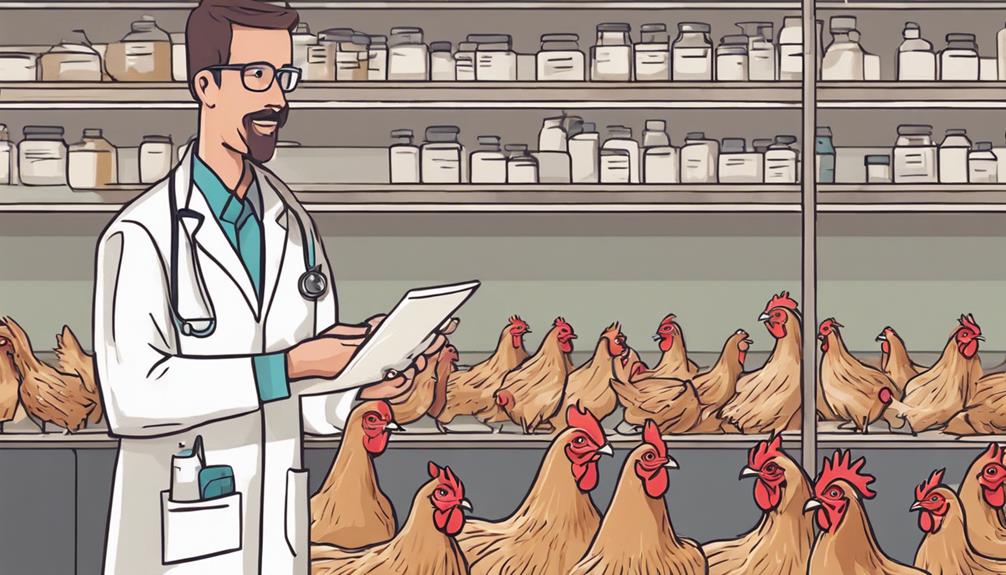Why Does Chicken Parasite Treatment Matter?"
Ensuring proper chicken parasite treatment matters because it safeguards your flock's health. Parasites like mites, lice, and worms can harm chickens, impacting egg production and growth. Detecting signs early is crucial – watch for decreased egg laying or weight loss. Untreated parasites can lead to further health issues and reduced productivity. Regularly administering treatments, following a schedule, and maintaining coop hygiene are vital practices. Taking a holistic approach ensures your flock's well-being. Prioritizing parasite treatment is essential for the overall health and productivity of your chickens. Uncover more about effective treatment and prevention strategies for a thriving flock.
Importance of Chicken Health
Ensuring the health and wellbeing of your chickens is paramount to their overall productivity and quality of life. Proper chicken wellness and poultry care are essential aspects of raising a thriving flock. To maintain optimal health in your chickens, it's crucial to provide a balanced diet rich in nutrients such as proteins, vitamins, and minerals. Additionally, access to clean water at all times is vital for hydration and overall health.
Regular health checks and monitoring of your flock are necessary to detect any signs of illness early on. Observing your chickens' behavior, examining their droppings, and checking for any abnormalities in their appearance can help in identifying potential health issues promptly. Vaccinations play a significant role in preventing common poultry diseases, so it's important to follow a vaccination schedule recommended by poultry health professionals.
Creating a clean and comfortable living environment for your chickens is key to promoting their wellbeing. Regularly cleaning the coop, providing adequate ventilation, and ensuring proper spacing to prevent overcrowding are crucial aspects of poultry care. Good hygiene practices not only help prevent the spread of diseases but also contribute to the overall health and happiness of your chickens.
Common Chicken Parasites
Common Chicken Parasites can have detrimental effects on the health and productivity of your flock if not properly managed. Parasite prevention is crucial in maintaining the overall health of your chickens. Some common chicken parasites include mites, lice, and worms.
Mites are tiny parasites that can infest your chickens' feathers and skin, causing irritation and stress to the birds. Regularly checking your flock for mites and using appropriate treatments can help prevent infestations.
Lice are another common parasite that can affect chickens, leading to feather damage and skin irritation. Inspecting your chickens regularly and providing clean bedding can aid in lice prevention.
Worms are internal parasites that can cause serious health issues in chickens if left untreated. Regular deworming and practicing good hygiene in the coop can help prevent worm infestations. Health maintenance is essential in ensuring that your chickens remain parasite-free and thrive.
Signs of Parasite Infestation
Identifying early signs of parasite infestation in your chickens is crucial for prompt treatment and prevention of further health issues. Parasite prevention is key in maintaining the overall well-being of your flock. Early detection of parasites can help you take immediate action to protect your chickens from potential harm.
One of the most common signs of parasite infestation in chickens is a drop in egg production. If you notice a sudden decrease in the number of eggs your hens are laying, it could be a red flag for parasites. Additionally, changes in the appearance of the eggs, such as unusual shell texture or shape, may also indicate a parasitic infection.
Weight loss or poor weight gain despite a good diet is another sign to watch out for. Parasites can cause chickens to lose weight or have stunted growth, even when they're fed properly. Keep an eye on your chickens' body condition and weight to catch any potential issues early on.
Behavioral changes, such as increased lethargy, decreased activity, or isolation from the flock, can also signal a parasite infestation. Healthy chickens are usually active and social, so any significant changes in behavior should prompt a closer inspection for parasites.
Risks of Untreated Parasites
Detecting and treating parasites in chickens is essential to prevent potential health complications and ensure the well-being of your flock. Neglecting parasite treatment can pose serious risks and consequences for your chickens, impacting their health and productivity.
Here are the risks of untreated parasites:
- Decreased Egg Production: Parasites such as mites and worms can cause stress to chickens, leading to a decrease in egg production. Infested chickens may lay fewer eggs or produce lower quality eggs, affecting your overall yield.
- Weight Loss and Poor Growth: Parasites feed on the nutrients meant for your chickens, causing weight loss and inhibiting proper growth. Young chickens are particularly vulnerable, and untreated parasites can stunt their development and overall health.
- Increased Susceptibility to Diseases: Parasite-infested chickens have weakened immune systems, making them more susceptible to other diseases. Untreated parasites can pave the way for secondary infections, further jeopardizing the health of your flock.
Best Practices for Treatment
Regularly administering parasite treatments to your chickens is crucial in maintaining their health and productivity. When it comes to treating parasites in chickens, it's essential to not only address current infestations but also to implement preventative measures to avoid future issues. Taking a holistic approach to parasite treatment involves a combination of strategies to ensure the overall well-being of your flock.
One of the best practices for treating parasites in chickens is to establish a regular deworming schedule. Consult with a veterinarian to determine the most effective deworming products for your specific situation. Additionally, practicing good coop hygiene by regularly cleaning and disinfecting the living quarters can help reduce the risk of parasite infestations.
Another important aspect of parasite treatment is monitoring your chickens for any signs of infestation. Keep an eye out for symptoms such as decreased egg production, weight loss, ruffled feathers, or visible parasites in their droppings. Early detection can make treatment more effective and prevent the spread of parasites to the rest of the flock.
Natural Remedies for Chickens
To enhance the overall health and well-being of your flock, exploring natural remedies for chickens can offer alternative approaches to parasite treatment beyond conventional methods. When considering herbal supplements and holistic approaches, you're delving into a realm of natural remedies that can support your chickens' immune systems and overall vitality.
Here are three options to consider:
- Garlic: Known for its antiparasitic properties, garlic can be added to your chickens' diet to help deter parasites. It contains sulfur compounds that parasites find unpleasant, potentially reducing infestations.
- Apple Cider Vinegar: Adding a small amount of apple cider vinegar to your chickens' water can create an environment in their digestive system that's less hospitable to parasites. The acidity of the vinegar may help to prevent parasites from thriving.
- Pumpkin Seeds: Rich in cucurbitacin, pumpkin seeds have been traditionally used as a deworming agent. The seeds contain amino acids that paralyze parasites, making it easier for your chickens to expel them naturally.
Consultation With Veterinarian

Consult with a poultry veterinarian to ensure the effective diagnosis and treatment of any potential parasite issues in your chicken flock. A veterinarian specializing in poultry health can provide valuable insights into identifying specific parasites affecting your chickens and recommend appropriate treatment options tailored to your flock's needs. They can conduct thorough examinations, including fecal tests and skin scrapings, to determine the type of parasites present and the most effective course of action.
When consulting with a veterinarian, be prepared to discuss various treatment options and alternatives available for managing parasite infestations in chickens. Depending on the type of parasite involved, treatment may involve medications, topical applications, or environmental management strategies to eradicate the parasites and prevent reinfestation. Your veterinarian can guide you on the proper administration of medications and the duration of treatment required to ensure successful parasite management.
In addition to treating existing parasite infestations, veterinarians can also offer valuable advice on parasite prevention and management strategies to safeguard your chicken flock's health in the long term. By implementing effective biosecurity measures, maintaining a clean coop environment, and practicing regular parasite monitoring, you can minimize the risk of future infestations and promote the overall well-being of your chickens. Collaborating with a poultry veterinarian is essential for addressing current parasite issues and establishing proactive measures to protect your flock from potential threats.
Preventing Future Infestations
Implementing effective biosecurity measures is crucial in preventing future parasite infestations in your chicken flock. To ensure the health and well-being of your backyard chickens, consider the following holistic approach to poultry care:
- Maintain a Clean Environment: Regularly clean and disinfect your chicken coop and surrounding areas to reduce the risk of parasites thriving in the environment. Remove any feces, old bedding, and spilled feed promptly to minimize potential breeding grounds for parasites.
- Practice Proper Hygiene: Wash your hands thoroughly before and after handling your chickens to prevent the spread of parasites. Additionally, consider having dedicated footwear for the coop area to prevent carrying external parasites into the living quarters of your chickens.
- Monitor and Quarantine New Additions: Introducing new chickens to your flock can potentially bring in parasites. Before integrating new birds, quarantine them for a period while monitoring their health. This step helps prevent introducing parasites to your existing flock and allows you to address any potential issues before they spread.
Frequently Asked Questions
Can Chicken Parasites Be Transmitted to Humans?
Yes, chicken parasites can be transmitted to humans through zoonotic transmission. It's crucial to take precautions to prevent this transfer as it poses health risks.
Proper treatment and prevention methods for chicken parasites are essential to safeguard human health.
Are There Any Side Effects to Parasite Treatments for Chickens?
When treating chicken parasites, consider potential side effects. Treatment effectiveness varies based on the medication used and the specific parasites present.
Some treatments may cause temporary side effects like mild digestive issues or changes in egg production. Long term implications can include developing resistance in parasites if treatments aren't rotated.
Consult a veterinarian for guidance on the most effective and safe parasite treatment options for your chickens.
How Often Should Chickens Be Checked for Parasites?
To keep your chickens healthy, regular parasite prevention is crucial. Conduct routine checks on your flock to catch any parasite infestations early.
Check for signs like decreased egg production, weight loss, or abnormal behavior. Preventative measures can include keeping the coop clean, using safe treatments, and monitoring your chickens' health.
Can Chickens Build Immunity to Parasites Over Time?
Chickens can develop immunity to certain parasites over time, which is crucial in poultry farming. Immunity development occurs as chickens are exposed to parasites, prompting their immune systems to build resistance.
This natural process helps in reducing the impact of parasites on the birds' health. Understanding how chickens can build immunity to parasites is significant for maintaining healthy flocks and minimizing the need for extensive parasite treatment interventions.
What Is the Impact of Chicken Parasites on Egg Production?
When chickens are afflicted with parasites, their egg production can be significantly impacted. Parasites can cause a decrease in egg quality and productivity, leading to economic implications for farmers.
Lower egg output and compromised quality can result in financial losses for poultry producers. Proper parasite treatment is essential to maintain healthy chickens, optimal egg production, and overall economic success in the poultry industry.
Conclusion
Ensuring proper treatment for chicken parasites is crucial for maintaining the health and well-being of your flock. By being vigilant for signs of infestation, promptly addressing any issues, and consulting with a veterinarian for guidance, you can help prevent serious health risks and ensure a healthy environment for your chickens.
Implementing best practices for treatment and using natural remedies can also aid in keeping your chickens parasite-free and thriving. Prioritizing chicken parasite treatment is essential for the overall health of your flock.
